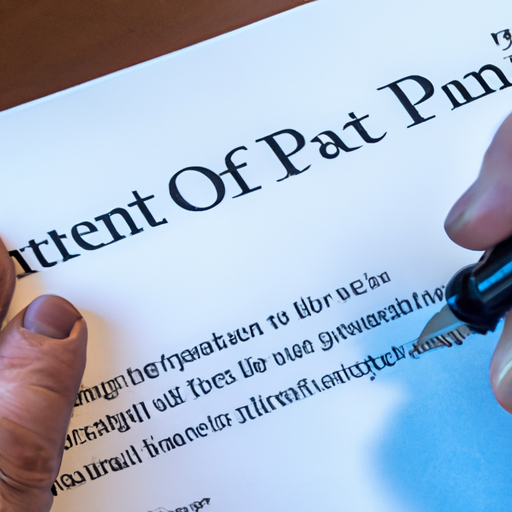If you find yourself in need of legal assistance regarding intellectual property matters, look no further than the Intellectual Property Lawyer in Salina, Utah. With a deep understanding of the complexities surrounding intellectual property law, this lawyer is dedicated to providing comprehensive guidance and effective solutions to businesses and business owners alike. By offering a personalized approach and a vast knowledge of IP issues, the lawyer aims to create a compelling and informative blog that speaks directly to individuals facing these concerns. Through engaging case studies, real-life scenarios, and expert advice, this lawyer sets themselves apart from others in the field, inspiring confidence and trust in their abilities. So, if you’re searching for a reliable intellectual property lawyer in Salina, Utah, do not hesitate to reach out and schedule a consultation.
What Is Intellectual Property Law?
Intellectual Property (IP) refers to creations of the mind, such as inventions, literary and artistic works, designs, symbols, names, and images used in commerce. Intellectual Property Law governs the legal rights and protections granted to individuals or entities who create these intellectual assets. It ensures that creators can benefit from their work and prevents others from using or reproducing their creations without permission or proper compensation.
Definition of Intellectual Property
Intellectual Property encompasses a wide range of intangible assets that can be legally protected. This includes patents, trademarks, copyrights, trade secrets, and industrial designs. Patents protect inventions, trademarks safeguard brand names and logos, copyrights protect creative works such as books or music, trade secrets safeguard valuable business information, and industrial designs protect the unique appearance of a product.
Types of Intellectual Property
There are several types of intellectual property that can be protected under IP law. These include:
-
Patents: Patents protect the rights of inventors by granting exclusive rights to their inventions. This prevents others from making, using, or selling the invention without permission for a limited period of time.
-
Trademarks: Trademarks protect brand names, logos, and symbols that identify and distinguish goods or services of one company from those of others. Trademarks can include words, designs, sounds, and even smells.
-
Copyrights: Copyrights protect original works of authorship such as books, music, movies, or software. Copyright gives the creator exclusive rights to reproduce, distribute, and display their work.
-
Trade Secrets: Trade secrets protect valuable and confidential business information that gives a company a competitive advantage. Trade secrets can include formulas, recipes, customer lists, manufacturing processes, or marketing strategies.
-
Industrial Designs: Industrial designs protect the aesthetic or visual appearance of a product. This includes the shape, configuration, pattern, or ornamentation of an object.
Importance of Intellectual Property Law
Intellectual Property Law plays a crucial role in encouraging innovation, creativity, and economic growth. By providing legal protection and incentives for creators and inventors, it encourages them to invest time, effort, and resources into developing new ideas and creations. Intellectual Property Law also fosters fair competition by preventing others from unfairly exploiting or copying someone else’s work. Overall, Intellectual Property Law protects the rights of creators and contributes to the advancement of society as a whole.
Why Do You Need an Intellectual Property Lawyer?
Navigating the complexities of Intellectual Property Law can be a daunting task. That’s why it’s essential to have an experienced Intellectual Property Lawyer by your side. An Intellectual Property Lawyer can help you protect your intellectual assets, enforce your rights, and guide you through the entire legal process.
Protecting Your Intellectual Property
One of the primary roles of an Intellectual Property Lawyer is to help you protect your intellectual assets. They can assist you in identifying what qualifies as intellectual property and guide you through the process of securing patents, trademarks, copyrights, or trade secret protection. They will ensure that your intellectual property is registered correctly and provide advice on how to maintain and enforce your rights.
Enforcing Your Intellectual Property Rights
In the event that your intellectual property rights are infringed upon, an Intellectual Property Lawyer will be your advocate. They will help you navigate the legal process of enforcing your rights and taking appropriate action against infringing parties. This may involve sending cease and desist letters, negotiating settlements, or engaging in litigation if necessary.
Navigating the Complexities of Intellectual Property Law
Intellectual Property Law is a complex and ever-evolving field. It involves a variety of legal issues, including licensing agreements, contracts, disputes, and international intellectual property protection. An Intellectual Property Lawyer has the knowledge and expertise to navigate these complexities on your behalf, ensuring that your rights and interests are protected at every step.

Services Provided by an Intellectual Property Lawyer
An Intellectual Property Lawyer offers a range of services to help individuals and businesses protect and enforce their intellectual property rights. Some of the key services provided by an Intellectual Property Lawyer include:
Intellectual Property Registration
An Intellectual Property Lawyer can help you navigate the process of registering your intellectual property, whether it’s a patent, trademark, copyright, or trade secret. They will ensure all necessary paperwork is filed correctly and that your intellectual property is protected under the applicable laws.
Trademark and Copyright Infringement
If you believe someone is using your trademark or copyright without permission, an Intellectual Property Lawyer can assist you in enforcing your rights. They will investigate the infringement, gather evidence, and take appropriate legal action to protect your intellectual property.
Licensing and Contracts
An Intellectual Property Lawyer can help you draft, negotiate, and review licensing agreements and contracts related to your intellectual property. This ensures that your rights are protected, and you receive proper compensation for the use of your intellectual assets.
Cease and Desist Letters
In cases of intellectual property infringement, an Intellectual Property Lawyer can draft and send cease and desist letters to the infringing parties. These letters outline the rights being infringed upon and demand that the infringing activity cease immediately. Cease and desist letters are often the first step in resolving intellectual property disputes.
Litigation and Dispute Resolution
If informal negotiations fail to resolve an intellectual property dispute, an Intellectual Property Lawyer can represent you in litigation or alternative dispute resolution methods. They will advocate for your rights in court and work towards a favorable resolution, whether through settlement or a court judgment.
How to Choose the Right Intellectual Property Lawyer
Choosing the right Intellectual Property Lawyer is crucial to protecting your intellectual property and achieving your desired outcomes. Here are some key factors to consider when selecting an Intellectual Property Lawyer:
Experience and Expertise
Look for an Intellectual Property Lawyer with extensive experience and expertise in the specific area of intellectual property law relevant to your needs. A lawyer who is well-versed in patents may not necessarily have the same level of knowledge in copyright or trademark law.
Good Communication Skills
Effective communication is essential when working with a lawyer. Choose an Intellectual Property Lawyer who can explain complex legal concepts in a clear and concise manner. They should be able to understand your goals and concerns and keep you informed throughout the legal process.
Proven Track Record
Research the reputation and track record of the Intellectual Property Lawyer you are considering. Look for testimonials, case studies, or examples of successful outcomes they have achieved for clients in similar cases. A lawyer with a proven track record of success will instill confidence in their ability to handle your case effectively.
Cost and Fees
Discuss the cost and fee structure upfront with potential Intellectual Property Lawyers. Make sure you understand how they bill for their services and what you can expect in terms of costs. Consider the value and expertise the lawyer brings to your case rather than solely focusing on the cost.
Industry Knowledge
Choose an Intellectual Property Lawyer who has experience working in your industry or has knowledge of the specific challenges and regulations that may apply to your intellectual property. They should be up to date with the latest trends and developments in your industry to provide you with the most relevant and effective legal advice.

Frequently Asked Questions About Intellectual Property Law
What is the process of filing for a trademark or copyright?
The process of filing for a trademark or copyright involves several steps. For a trademark, you must conduct a thorough search to ensure your proposed mark is not already in use by someone else. If the mark is available, you can proceed with filing an application with the appropriate intellectual property office. Copyright registration, on the other hand, is typically automatic upon creation of the work, but registering your copyright provides additional legal protections.
How long does it take to get a trademark or copyright?
The time it takes to obtain a trademark or copyright can vary depending on several factors, including the backlog at the intellectual property office and whether any objections or disputes arise during the process. Generally, it can take several months to a year or more to obtain a trademark registration, while copyright registration is typically faster and can be completed within a few months.
What are the potential consequences of infringing on someone’s intellectual property?
Infringing on someone’s intellectual property can have serious legal and financial consequences. If found liable for infringement, you may be required to cease using the infringing material, pay damages to the rights holder, or face legal action, which can result in costly litigation and reputational damage.
Can I protect my intellectual property internationally?
Yes, it is possible to protect your intellectual property internationally. Depending on the country or region, you may need to file individual applications or take advantage of international treaties and agreements. Working with an Intellectual Property Lawyer experienced in international intellectual property law can help ensure your rights are protected worldwide.
What is the difference between a trademark and a copyright?
A trademark and copyright protect different types of intellectual property. A trademark is used to protect symbols, logos, or names that identify and distinguish goods or services of one company from those of others. On the other hand, copyright protects original works of authorship, such as books, music, movies, or software. Trademarks give the owner exclusive rights to use the mark in connection with specific goods or services, while copyright gives the creator exclusive rights to reproduce, distribute, and display their work.
The Importance of Protecting Your Intellectual Property
Protecting your intellectual property is crucial for several reasons. By safeguarding your creations, you can:
Preserving the Value of Your Creations
Protecting your intellectual property ensures that you can leverage its value in various ways. It allows you to commercialize your creations, license them to others, or use them as assets in business negotiations. Without proper protection, others may exploit or profit from your creations without your consent, diminishing their value.
Preventing Unauthorized Use
By securing intellectual property rights, you can prevent others from using or copying your creations without permission. This helps maintain the integrity and originality of your work, ensuring that you have control over how it is used and distributed.
Maintaining a Competitive Advantage
Intellectual property protection can provide you with a competitive advantage in the marketplace. It distinguishes your products or services from those of your competitors, making it easier for consumers to identify and choose your brand. By enforcing your intellectual property rights, you can prevent others from capitalizing on your innovative ideas and maintain your market position.
Attracting Investors and Partners
Investors and business partners are more likely to be attracted to companies that have a strong portfolio of protected intellectual property. Intellectual property protection demonstrates that your company is innovative, forward-thinking, and committed to preserving the value of its creations. It can give potential investors and partners the confidence they need to invest in or collaborate with your business.
Enforcing Your Intellectual Property Rights
Enforcing your intellectual property rights is essential to protect your interests and maintain the value of your creations. When you encounter unauthorized use or infringement, there are several steps you can take to enforce your rights.
Identifying Infringements
The first step in enforcing your intellectual property rights is identifying any instances of infringement. Regularly monitor the market and online platforms to identify any unauthorized use of your trademarks, copyrights, or patents. Work with an Intellectual Property Lawyer to conduct thorough investigations and gather evidence of the infringement.
Cease and Desist Letters and Legal Notices
Once an infringement is identified, an Intellectual Property Lawyer can assist in sending cease and desist letters or legal notices to the infringing parties. These letters formally notify the infringer of their unauthorized use and demand that they immediately cease their infringing activities. Cease and desist letters can often resolve disputes without the need for further legal action.
Litigation and Legal Action
In some cases, informal negotiations or cease and desist letters may not lead to a satisfactory resolution. If necessary, an Intellectual Property Lawyer can initiate litigation or legal action on your behalf. They will represent your interests in court, present evidence of infringement, and work towards obtaining an injunction to stop the unauthorized use.
Damage Awards and Compensation
Successful enforcement of your intellectual property rights may result in damage awards or compensation. If infringement is proven, you may be entitled to financial damages, which can include actual damages (loss of sales, profits, or reputation) or statutory damages (a predetermined amount awarded per infringed work). An Intellectual Property Lawyer can help ensure you receive the compensation you deserve for the unauthorized use of your intellectual property.
Understanding Trademark and Copyright Infringement
Trademark and copyright infringement are common forms of intellectual property violations. Understanding these forms of infringement is crucial in protecting your intellectual property rights.
Defining Trademark Infringement
Trademark infringement occurs when someone uses a trademark that is identical or similar to another trademark in connection with similar goods or services, causing a likelihood of confusion among consumers. Infringement can also occur if someone dilutes the distinctive quality of a famous trademark, tarnishes its reputation, or uses it in a way that implies endorsement or affiliation.
Defining Copyright Infringement
Copyright infringement occurs when someone reproduces, distributes, displays, performs, or makes derivative works of a copyrighted work without the permission of the copyright owner. Infringement can occur in various forms, including unauthorized copying, uploading copyrighted material online, or using copyrighted material without proper attribution.
Proving Infringement
To prove trademark or copyright infringement, you must demonstrate that the alleged infringer has used your protected intellectual property without permission or violated the exclusive rights granted to you. This may involve providing evidence of the infringing activity, such as showing similarities between trademarks or demonstrating a direct copy of copyrighted material.
Consequences of Infringement
Trademark and copyright infringement can have severe legal consequences. If found liable for infringement, the infringer may be ordered to cease using the infringing material, pay damages to the rights holder, and potentially face legal action. In some cases, the court may award attorneys’ fees and issue injunctions to prevent further infringement. It is essential to enforce your rights and take appropriate legal action to protect your intellectual property.

The Role of Licensing and Contracts in Intellectual Property
Licensing agreements and contracts play a vital role in managing and protecting your intellectual property assets. Working with an Intellectual Property Lawyer can help ensure that your licensing and contracts are properly structured and provide the necessary protections.
Securing Licensing Agreements
Licensing agreements allow you to grant others the right to use your intellectual property while maintaining control over its use. An Intellectual Property Lawyer can help you draft licensing agreements that clearly outline the terms and conditions of use, ensuring your rights are protected and that you receive appropriate compensation for the use of your intellectual assets.
Drafting and Negotiating Contracts
Contracts play a crucial role in protecting your intellectual property rights when collaborating or entering into business relationships. An Intellectual Property Lawyer can assist in drafting and negotiating contracts that protect your interests, including non-disclosure agreements, confidentiality agreements, joint venture agreements, distribution agreements, or technology transfer agreements.
Ensuring Proper Usage and Compensation
An Intellectual Property Lawyer will help ensure that your licensing agreements and contracts protect your intellectual property rights and provide for proper usage and compensation. They will help you enforce contract provisions, monitor licensee compliance, and address any breaches or disputes that may arise. By having well-structured contracts in place, you can protect your intellectual property and safeguard your business interests.
Conclusion
Intellectual Property Law is a complex and essential area of law that is crucial for protecting your valuable intellectual assets. Hiring an experienced Intellectual Property Lawyer can help you navigate the intricacies of IP law, protect and enforce your rights, and ensure that you receive the full benefits and value of your intellectual property. By understanding the importance of protecting your intellectual property, enforcing your rights when necessary, and leveraging licensing agreements and contracts, you can safeguard your creations, maintain a competitive advantage, and attract investors and partners to support your business goals. If you have any further questions or need assistance with any aspect of intellectual property law, contact Intellectual Property Lawyer Salina Utah for a consultation and expert legal advice.



